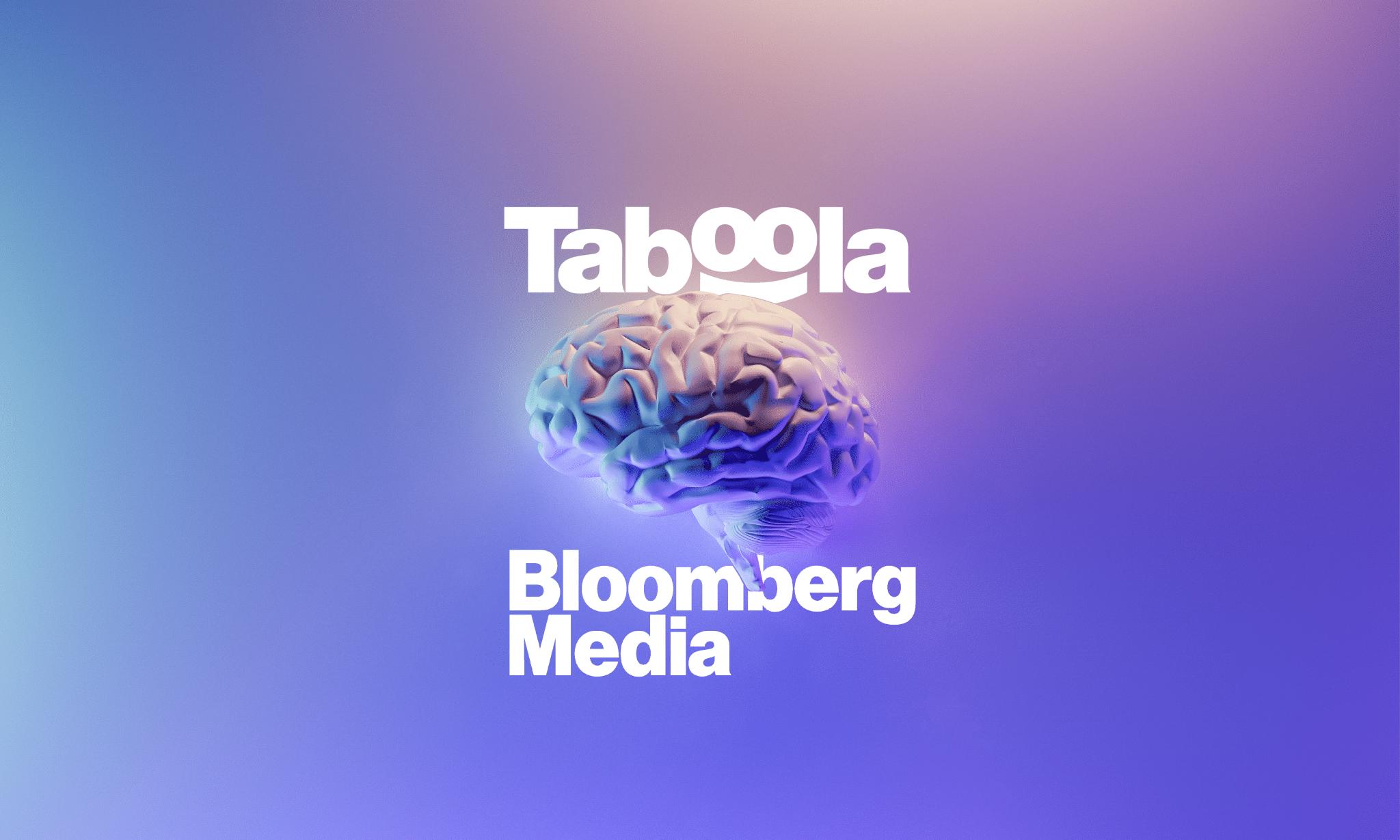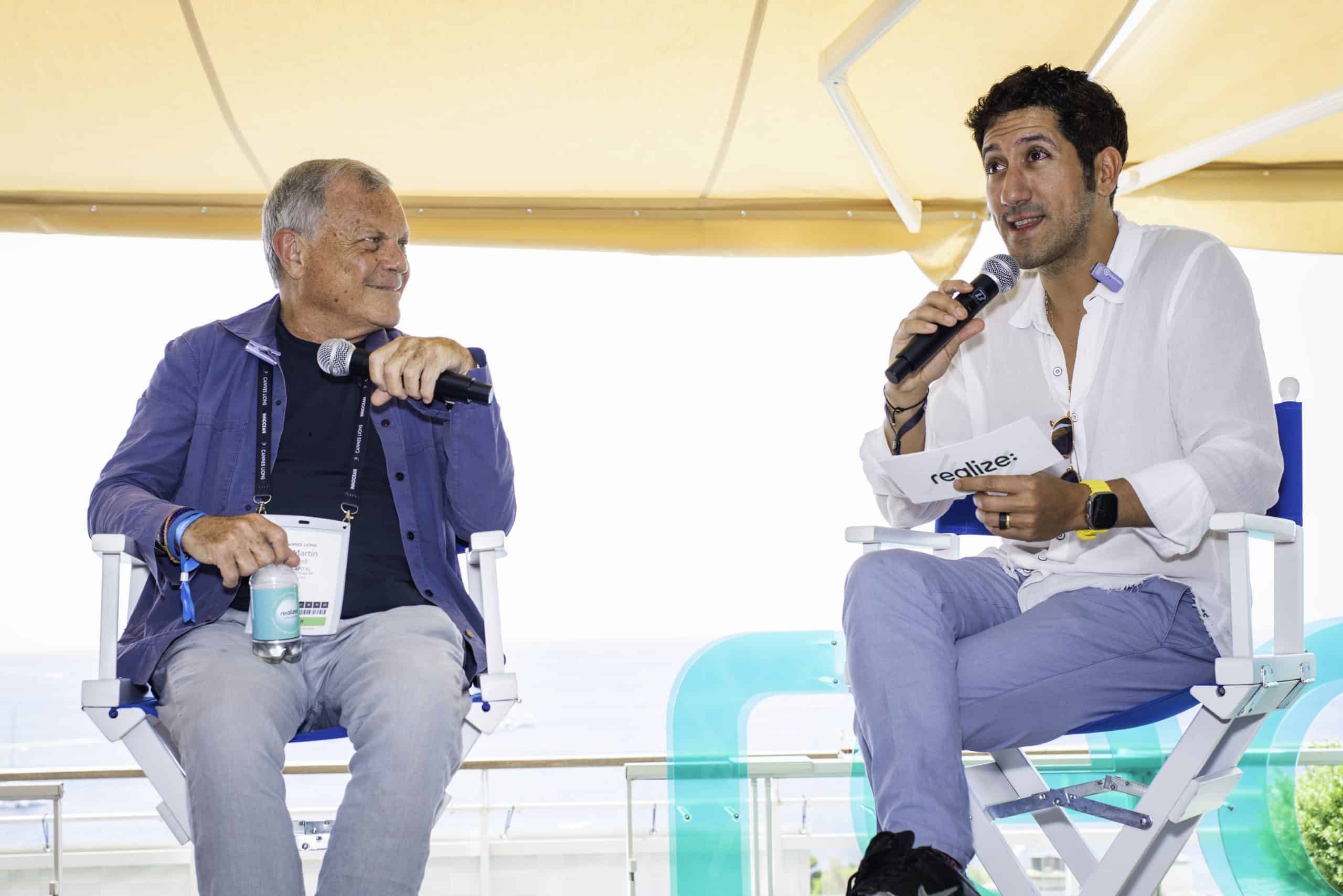Times are changing, and the advertising ecosystem is being shaken up. Brands that relied on the third-party cookie and Apple’s IDFA for attribution now have to rethink their approaches. A tough economy is forcing marketers to find ways to achieve the same results with smaller budgets while publishers are struggling to differentiate themselves as competition ramps up.
If you feel the future looks bleak, or you’re unsure which path to go down, fear not because this episode of Behind Media Minds reveals some exciting changes and many opportunities!
Our CEO and Founder, Adam Singolda, met up with serial entrepreneur, Founder and CEO of Zeta Global, David Steinberg, to get his take on the industry’s future. During their chat, the two discuss how Zeta is evolving to meet customer needs, the growing interest in CTV, and the importance of helping marketers create attribution models tied to their goals.
They talk about how e-commerce has evolved and where it’s going, why personalization is here to stay, and of course, TikTok. David also offers his thoughts on Web 3.0 and why he thinks his version, Web 2.5, is a better compromise.
There are so many great insights in this video. Grab a coffee and get ready to take notes!
Adam: David, this is so much fun! Rarely in life do you get to do amazing things at work with people you love, and we’re such good friends. Before I’m going to let you introduce yourself, I just want to tell a personal story, if I may.
So, I moved to America 13 years ago. In many ways, this is our, my bar mitzvah session, you know, because I’m 13 years in this country. But just upon my arrival, we were introduced by a mutual friend.
David: Yep.
Adam: So you were very kind because after spending time with me, you emailed me late at night, and you said, you asked me if I want to join you for the Masters, and I, you know, I grew up in Israel. I didn’t really play golf ever, so I searched ‘what is the Masters’ and I saw it’s golf, so I figured you were inviting me to play golf with you, and I replied, “Sorry man, I don’t really play golf.”
David: Like, I said, “I don’t think Tiger needs a playing partner this week.”
Adam: Exactly.
David: It’s a great group of people. We’re going to have a lot of great food and watch some fun golf outside.
Adam: So, this is how we get to know each other. But before, you know, we kick this off, thank you for joining us. Do you want to introduce Zeta, you, and then we’ll jump in?
David: So, I’m David Steinberg. I’m a serial entrepreneur. I’m a serial entrepreneur for the same reason a lot of us are. I couldn’t get a job. So, when I came out of school, I started a company, and sort of seven companies later, here I am.
Zeta, which is a data and analytics platform, which helps very large enterprises create, maintain, and monetize customers at a substantially lower cost than they can [if they were] not using our software and our data.
Adam: Zeta Live, which is, I just can’t believe you pulled that thing off with the amazing people that are speaking. Three thousand people that are joining.
David: Five thousand.
Adam: Five thousand.
David: Five thousand. Don’t cheat us out of that last two thousand people.
Adam: So, I don’t know how you do that while doing everything else, but do you want to tell us about the event? What happened? How it came to life?
David: Well, we originally started Zeta Live a couple of years ago on the hope of starting to build our brand as an organization and to bring thought leaders together with the marketing industry. And, you know, the first year was good. This year I think was just off the charts, and everybody coming together, uh, it was, it was amazing.
Adam: You know, I think there’s a lot of conversation about e-commerce these days. You know we’ve been working from home. We’re buying online so much more than we used to just going into a store. You actually did e-commerce back in the 90s. I’m curious, from your perspective, what were the biggest changes, you know, over the last 20 to 30 years when you think about just e-commerce then and now?
David: Well, when we started my last company, which was focused on the e-commerce distribution of wireless phones, the biggest barrier was convincing people that buying something online was safe. People had a massive fear of using a credit card on the internet. Today, it’s ubiquitous, right? It’s almost laughable, right because we all know that if somebody were ever to do something, you would be responsible for like 99.9 of the cases.
But the other thing that really has changed dramatically is just the speed, right? So you sort of have Moore’s law that has really driven sort of e-commerce capabilities to an incredible level. I mean, if you look at page load times, [these] were things we were worried about in 1997 when we founded that company. We were trying to get a page load time to under 30 seconds.
I know, it’s laughable. Now it’s like a mil, a hundredth of a millisecond, whatever it is, but, uh, the speed with which you can operate, the trust which has been instilled in e-commerce transactions, has really changed the game dramatically since when I first got into that game many, many years ago.
Adam: Trust is a big word, you know, an important one especially for consumers and younger audiences even more, and I actually think that one of the biggest upsides of e-commerce these days versus back then is that when you need to make a decision to buy something, you know, you gain so much value by going to a review website.
If you think of the New York Times Wire Cutter, right, and you know Review.com by USA Today and all these which we had on Zeta last year, right? So, all these websites that invest so much in reviewing products give consumers value that is unbiased, that helps them make those decisions. I mean, trust is such a core piece of consumer behavior these days.
David: Yeah, well, consumer discovery is a mission-critical component of the internet. It’s why that little company Google tends to work, right, but if you think about it, there’s long been opportunities to do discovery and research on the internet. And people have, since the late 90s, done a lot of that.
To your point, the leap from research on the internet and purchasing offline to research on the internet and transacting online was a big one. And whether we crossed that in 2000, 2005, 2010, 2020 – I don’t know, we’ve crossed it right. And people look at that as a ubiquitous transaction.
Adam: I want to take you back, I don’t know, a year and a half, two years. The last two years for everyone, for you, for me, for the industry, it hasn’t been easy, from the pandemic times to a recession, inflation, and supply chain. I mean a war in Europe, so much has happened. During that time, you took Zeta public.
David: Yeah.
Adam: And you know, you’ve done such an amazing job, you know, doing that. What is the secret to your success? What do you focus on? What can you share from that journey over the last two years specifically?
David: Well, that’s a very big question. First of all, going public was something that most companies that are private equity backed, at some point, have to consider seriously right because you have your capital structure set up in a way that you’ve got all these different preferred instruments that have come in. They’ve all got different timing in them. It’s actually a very convenient way to convert your capital structure into a much more simplistic structure.
So, you know, we turned down, I’m sure, much like you, multiple offers to sell the company over the years, and we’ve had a singular vision of really creating everything that a marketer needs in one place, which has helped us to really win in the marketplace because what we see is chief marketing officers want one solution.
They don’t want 17 different providers to provide data, analytics, activation, CRM. We do all of that in the Zeta marketing platform, but it’s also made it a very confusing story because you can’t say, “Oh, they’re them,” or “Oh, they’re them.”
So getting the company public was, uh, was interesting. As a public company, we beat five quarters in a row through the last five quarters. We’ve raised our guidance five quarters in a row. We did so most recently, uh, on our second quarter, which I’m trying to think about where we are in the cycle. We beat our second quarter handedly this year. We then raised the third quarter and raised the year.
The really interesting thing about the Zeta marketing platform is it’s so incredibly focused on the efficiency and efficacy of marketing that in a downturn, what we’ve seen is marketers are looking to spend less money yet generate the same number of customers. Because our entire pitch for years is if you do everything together, you use the data cloud plus the marketing cloud. We can do full attribution modeling.
Adam: Right.
David: So we’re able to lower the average marketer’s cost by almost 50 percent per customer acquisition or retention. And in a downturn, we’ve seen clients scaling up with us, so it’s crazy to think that in the second quarter of this year, we grew faster than in all of the quarters prior to it.
Adam: Right.
David: So, you know, in the last four or five quarters, I can’t say ten years ago, but it’s been really interesting to see that.
Adam: And by the way, it’s remarkable to see the performance over the last year, you know, since you went public, especially during those times. And I do hear from so many marketers and agencies and publishers that, especially right now, people want to do want to work with less partners and go deeper with them, which is exactly what you can offer them.
I do want to speak about, you know, when you look at the last, another interesting trend and change over the last two years with TikTok. It’s amazing TikTok is outbidding Facebook. You know, Facebook is such a phenomenon on its own, and now we’re seeing this thing that becomes even bigger capturing more time in our lifetime.
You know, it’s almost amazing to me to see disruption happening in front of us and what can we learn from that, but I’m curious from your perspective because you do want to provide a 360 kind of view of consumer behavior.
How do you take all of those changes into consideration as you work with marketers? So, you know, the social networks, the open web. And you know consumer behavior changes. How do you keep taking all of those singles in to keep making your platform even more valuable to marketers?
David: I remember when AOL, Yahoo, and MSN were going to rule the world, right? Never gonna change. And before that, it was, you know, MCI, right? I mean, there’s been incumbents that have been undone, and what I would say is the one thing that is consistent about technology is it is going to change. And today, we’re seeing a big change.
A lot of it came out of Apple’s move to eliminate the IDFA, which really hurt the efficacy of platforms that are mobile-focused And TikTok has sat outside of that because TikTok is so focused on Gen Z and Gen Alpha that they’re really driving brand and they haven’t really focused on return on investment.
So, they’ve really become a bit of a juggernaut just because of the way they’re scaling. Because I’ve been doing this now for 30 years, I made the decision when we founded Zeta to never be fully dependent on any activation methodology. So the Zeta marketing platform is activation agnostic. In fact, if you look at it today, our fastest-growing business is CTV and over-the-top TV. We said last quarter that business grew over 300 percent year-over-year.
Adam: Wow.
David: And the key to our platform is the Zeta ID – the ability to identify the consumer anywhere using the Zeta ID. And, as you know, we’ve never used a third-party cookie to identify individuals or build attribution models, and we’ve never used Apple’s IDFA, so as efficacy has become problematic for some organizations, it’s benefited others. I think TikTok is one of the beneficiaries.
As we look at the landscape, I will tell you that with 100 percent certainty, whatever we think is the juggernaut today will not be the juggernaut in 10 years. There’ll be somebody new who will come along, who will be cooler. I don’t know if it’s going to be real, or if it’s going to be the next TikTok, or if it’s going to be the next, you know, major platform, whether it’s Netflix adding an ad-supported model, Disney plus adding an ad-supported model.
Adam: Right.
David: It’s just going to continue to change.
Adam: Changes are happening. I want to keep talking about user behavior because you’re seeing so much. I think that what we’re seeing, which is interesting to complement what you’re saying, is because we see mainly what people read, and that’s an interesting proxy for curiosity.
David: I think it’s a very good proxy.
Adam: And so we’re seeing, it’s interesting, people read less about luxury products. You know, I think especially after the, you know, the crypto generation of the last three years, you know, people are spending less on maybe scarce products of different kinds, but they overread and overspend on what makes them happy.
David: Yes.
Adam: You know, travel, experience.
David: Experience.
Adam: Experiences, exactly.
David: So, where we continue to see this massive outgrowth from Generation Z is specifically around experiences versus items. You’re seeing that really drive consumer behavior.
Adam: Another dear topic for both of us, and you know, from your point of view, and how your data cloud gets to see the open web and working with publishers, what are some of the trends you’re seeing? What do you think publishers maybe should do that they’re yet to be doing? What point of view do you have about the open web and publishers?
David: Well, listen. I mean, the open web, which is mission critical to the health of the internet in the long term, continues to be constricted by the walled gardens, right, so they’re continuing to sort of drive themselves as differentiated from the open web. One of the beauties of the Zeta marketing platform and Taboola is the ability to help marketers play in the open web and, quite frankly, a more reasonable cost but the same level of intent.
But we believe you’re going to start to see more haves and have-nots. As the third-party cookie dissipates, I don’t actually think we’re going to see a ‘it’s going away,’ but as different browsers make it easier and easier for people to be like, “I don’t want to be tracked. I don’t want to do this,” I think it’s going to get harder and harder for independent publishers to make a living.
And people say to me all the time – they’re like, “Wow, this is terrible. People are tracking what I’m doing. I hear you, but would you rather see an ad that’s relevant to you, or would you rather see an ad that’s totally irrelevant to you with the understanding that if all marketing dollars left the internet, the internet would go away?
Just like if all marketing dollars left, you know, linear TV, content couldn’t be created. You wouldn’t have shows. It wouldn’t exist. So, I actually believe this is a positive for the consumer, assuming you’re doing it the way we are, which is we’re using it to target ads. We’re not using it to do other things that could be, you know, considered inappropriate.
The larger publishers consolidate. They’re going to continue to do better inside of what will become a series of what we’re calling gardens, and those gardens might be open web today, but they’ll begin to segment.
Then you’re going to have the long tail, which will sort of play into either native, which will be great for you, or uh, you know, some of the Google products where you’re, you know, getting paid per click, but I think you’re going to see a series of haves and have-nots in the publishing ecosystem in the years to come.
Adam: We talked about privacy just now. Another related topic is brand safety. We see a lot of marketers at times narrow down their inventory for the sake of getting more safety, and at times, they’re willing to take more, be more exposed, and take a broader view but gain more scale. How do you think about brand safety versus scale and how to navigate them from Zeta’s point of view?
David: Yeah, so we, because we identified deterministic individuals, and we always are cross-referencing that with what they’re reading, it’s sort of very, very naturally built into our platform. That being said, if you look at the internet, there’s always sort of this scale versus safety, and it’s a mission-critical function. Different brands look at it very, very differently.
You know, you’ll have a global soft drink brand which is very focused on it, and you’ll have a fashion brand that doesn’t care, right? They, in fact, think some of that is cool.
Adam: Right.
David: So, you know, you’ve got to understand the marketer. You’ve got to understand what the brand’s needs are, and you know, quite frankly, I think you know it’s going to be a conversation we have for many, many years to come.
Adam: I also think the more companies like Zeta and,Taboola and others you know are spending time helping marketers see the value, create attribution models that they can tie into their goals. You know it helps them be more experimental and try new things.
David: We believe that if you’re not measuring your marketing, you’re wasting it. It’s, we really believe that. Advertising ran alongside the content people were consuming. That’s how TV started. It’s how newspapers started. It’s how the internet started.
Ultimately, I believe the content a consumer is consuming at that moment is less relevant to the actual intent of that consumer than what our platform could build by looking at a 360 degree of all of their behaviors online and offline, transactions, what they’re consuming.
And I do believe that platforms like Taboola and Zeta will be leaders in that change. And, if you look at our growth in CTV today, the vast majority of what we’re doing in CTV is running deterministic video ads to somebody watching a television show.
Adam: That’s right.
David: Versus an online video ad to a consumer who’s consuming it over a web browser.
Adam: We’re almost at the end of our session, which was because we could have done this for days like you know. There’s no limit to how much we can chat about stuff.
David: I could just talk to you forever, Adam.
Adam: Me as well, but so I want to ask one last question before I move to sort of my rapid kind of like a finishing question. So, you just recently, I read, you recently announced an AWS integration. I believe that’s the first marketing platform in that environment. What can you tell us that’s interesting? Why did you do it? What can people expect?
David: Well, first of all, anytime you can partner with a platform that’s the scale of AWS, I mean, it’s going to be mission-critical to us. We’ve actually been partners with Snowflake for quite some time, focused on clean rooms and data rooms, and they have been just such an incredible partner for us.
Adding AWS and the credibility of being the first marketing cloud in the AWS platform as a native platform was a pretty big honor for us, and it’s allowed us to integrate into other large Enterprises faster. So where the client has Snowflake, we’re able to really integrate; where the client has AWS, we’re able to really integrate.
And I think one of the things that’s consistently lost about Zeta is that the vast majority of our revenue is software-based, so what we’re doing is we’re trying to do these very large software integrations, and we’re coming in through an RFP process. It’s very, very helpful to be partners with platforms like AWS and Snowflake.
Adam: This is fun. Like we said, we just had Zeta Live. We’ve seen some of the most interesting and provocative people speak on stage. I’m curious. As you’re thinking about the future, also on the back of what we just learned at the event, what do you think are going to be the biggest bets we might have? Is it a metaverse? NFTs? Something else? A mix of things? What’s the future look like?
David: All right, so some very evident things came out of it. That’s right. First and foremost, I think this sort of move from linear and analog marketing to digital is not just going to continue, it’s going to accelerate.
There’s this narrative that, you know, we have this big leap because of COVID, and now we’re going to go back. We’re not because attribution to marketing is becoming table stakes to marketers. And they just really care about it too much to go back to linear, where they’re sort of guessing right.
Two – the blockchain is going to massively change the world, whether that’s through NFTs, tokens cryptocurrency, I’m not sure we know yet. The ability to build providence from the beginning to the end of a transaction, in my opinion, is going to be game-changing to everything from the internet to real estate, right? So, when you look at that, you’re going to have just like sort of web 1.0.
You’re going to have massive winners and massive losers. What we talked about at the conference and Fred Wilson and I did a great, great panel on sort of moving on from Web 2.0. and Fred talked about web 3.0, and I talked about what I think is the future which is web 2.5.
And you know, I sort of coined that term around the concept of, I think, there’s a middle ground, right? So, if web 2.0 is large enterprises own everything, and web 3.0 is the consumer owns everything, I think the blend is in the middle. If you’re any level of creator, you’re going to begin to participate in the marketing revenue of all of the big Web 2.0 companies today.
I think they’re going to move in that direction. You’re seeing it with the top of the top. You’re already seeing it you know Instagram’s rolling out an e-commerce capability where they can participate. YouTube pays out more money to creators than probably anybody, right? So if you look at where that’s going, I think that web 2.5 is going to be the differentiator.
Adam: Thank you so much for doing this. I look forward to the next one we’ll have talking about the future. Until then, wine and cigars.
David: Adam, I love being with you.



